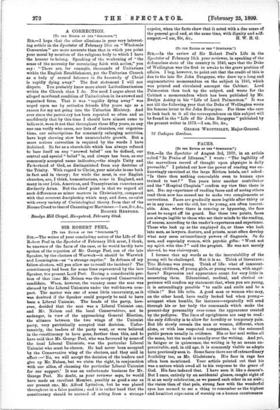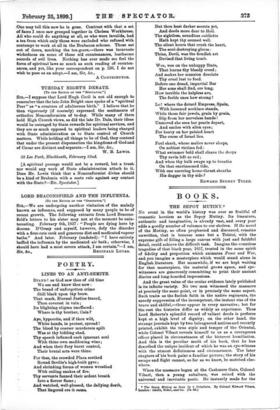FACES.
[To THE RD/TOE OP THE " SPECTATOR."
Stn,—In the Spectator of August 3rd, 1889, in an article called "In Praise of Idleness," I wrote : " The legibility of the marvellous record of thought upon physique is daily proveable." I pointed out how the power of reading was un- knowingly exercised at the large Riviera hotels, and asked : "Is there then nothing concealable even to human eyes trained to test ? " Ten years later another contributor and the "Hospital Chaplain" confirm my view that there is not. Bui, my experience of reading faces and of seeing others read them now has caused me to make two complements or corrections. Faces are gradually more legible after thirty or so in any case: not the old, but the young, are often inscrut- able. Also, where there is cunning or hypocrisy, the face mast be caught off its guard. Bar these two points, faces are always legible to those who set their minds to the reading, of course, according to the reader's expertness and experience. Those who look up as the employed do, or those who look into men, as lawyers, doctors, and priests, must often develop what may seem extraordinary powers of diagnosis. So do men, and especially women, with psychic gifts: "Went not my spirit with thee ? " said the prophet. He was not merely shrewd, he was clairvoyant.
I foresee that my words as to the inscrutability of the young will be challenged. But it is so. Think of literature : Tito Melema was young. Think of life: what of innocent- looking children, of young girls, or young women, with angel- faces ? Expression and appearance count for very little in measuring them. Educational, medical, and clerical ex- perience will confirm my statement that, when you are young, it is astoundingly possible "to smile and smile and be a villain !" But life tells. A good man or woman who may, on the other hand, have really looked bad when young— arrogant when humble, for instance—repeatedly will send through his or her body the commands which make the present-day personality over-come the appearance created by the pedigree. The lines of uprightness are easy to read : the only difficulty is to allow for heredity or temporary pain. But life slowly reveals the man or woman, different, when alone, or with less respected companions, to the esteemed public person usually in evidence. His or her soul writes all the same, but the mask is usually over the writing. And yet, in fatigue or in quiescence, the writing is by no means an- perceivable, and, in old age, it is commonly visible as adepts have previously seen it. Some faces there are of extraordinary flexibility too, as Mr. Gladstone's. His face in rage has often been mentioned. Your article pointed out that his was a nature which owed all to his response to the grace of God. His face indexed that. I have seen it like a demon's. But I once, entirely by an accidental glance, caught sight of it at an early celebration, as we passed each other in an aisle; the vision then of that pale, strong face with the wonderful eyes has seemed to me a thing to remember as the highest and humblest expression of worship on a human countenance
One may tell this now he is gone. Contrast with that a set of faces I once saw grouped together in Chelsea Workhouse. All who could do anything at all, or who were invalids, had a tea from which only those were excluded who refused with contempt to work at all in the Brabazon scheme. Those eat out of doors, mocking the tea-goers,—there was incarnate wickedness on some of those old countenances, loathsome records of evil lives. Nothing has ever made me feel the force of spiritual laws so much as such reading of counten- ances, and yet, like your correspondent on p. 236, I do not wish to pose as an adept.—I am, Sir, &c.,
A CONTRIBUTOR.







































 Previous page
Previous page